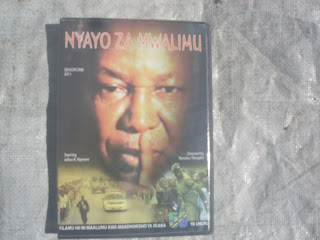SOME Dar es Salaam residents have criticized the production of a film documentary which has been designed to honour the father of the nation and his importance in modern Tanzania history in commemoration of the 50th anniversary celebrations of the country’s independence. The film titled, “NYAYO ZA MWALIMU” which literally means ‘footsteps of the teacher’ a popular title used to refer the first President Julius .K. Nyerere is currently sold in some parts of Dar es Salaam city centre at a negotiable price of between Tsh. 3,000 and Tsh. 5,000 respectively. Some interviewed residents who bought the film at Kariakoo market said that, “the film shows only few and not important areas that could enlighten the future generations on the basic important social and economic activities which were spearheaded by the father of the nation who died in October 1999”. According to one, Rhoda Simbale a resident of Vingunguti claimed that she thought the documentary would show the struggles of the farther of the nation towards the attainment of independence and any other activity as related to his charity idea of maintaining peace, unity and brotherhood. Another one, Joseph Mwambi who resides at Kinondoni was very happy to buy one film and thought it would show anything crucial to honour his credibility for being a long serving President and the founder of our nation. But to his great dismay, he was surprises to view the long speech which Mwalimu gave in a conference meeting with journalists he organized at the then Kilimanjaro hotel in Dar es Salaam. This was when Tanzania was getting prepared for the first multy-party elections in August 1995. Contrary to the expectations of many, the film shows only part of the Mwalimu’s visit of the battle field during the Kagera war in 1978/79 as well as when his body was being brought into the country aboard Air Tanzania plane (Ngorongoro). Other sections of it shows the procession amounted by a cross section of youths running after Mwalimu’s body while chanting slogans to praise his efforts, this was during when Mwalimu’s body was being driven to his Msasani residence in Dar es Salaam. Ally Abdallah, a resident of Ilala commented that, the film could have shown Nyerere’s efforts towards the liberation of southern African countries for which he was the Chairman of the front line states is such one aspect to be put in memory for the future generations not only in Tanzania but also for the benefits of the rest of the world.
 This is the film cover of a documentary that bears the portrait of Tanzania’s father of the nation. The film is not sufficient with the contents it deserves to honour the father of the nation in culmination of the 50th anniversary in commemoration of the country’s independence celebrations.
This is the film cover of a documentary that bears the portrait of Tanzania’s father of the nation. The film is not sufficient with the contents it deserves to honour the father of the nation in culmination of the 50th anniversary in commemoration of the country’s independence celebrations.
As a general comment and expectations of many said that the film does not portray sufficient contents if it was meant to honour Mwalimu’s efforts as the nation is celebrating its 50th anniversary of independence bearing the fact that, he had a reputable role to play for the attainment of the independence in 1961. When contacted for comment over the issue, the Director of the film Renatus Theophil said in a telephone interview that, when he asked for the permission to prepare this film he was restricted not to use some other parts of Mwalimu’s activities as they have been preserved as secret matters.
However, he could not even disclose who permitted him and for whom the work was intended, and instead he declined to say anything further. Social and political critics says that, the history of Mwalimu and the perils of nation building in Tanzania and Africa as a whole from before independence in 1961 to his retirement in 1985 is the idea of importance for the future generation of Tanzanians. Mwalimu led Tanzania into peaceful independence overcoming colonialism, internal divisions and cold war intrigue to build a unified nation that led the drive to liberate Southern Africa from white minority rule. While he never succumbs to corruption like many of his peers, Mwalimu dominated Tanzania politics for nearly 25 years. Without uncompromising idealism and piercing analysis, he inspired a generation with his vision for Africa as the “continent of hope for the human race”. He pursued his course out of his genuine desire to build a peaceful and prosperous society, and thus his failure cannot be attributed to greedy or other personal shortcomings but are rooted in deeper structural issues which continue to vex African leaders.












No comments:
Post a Comment